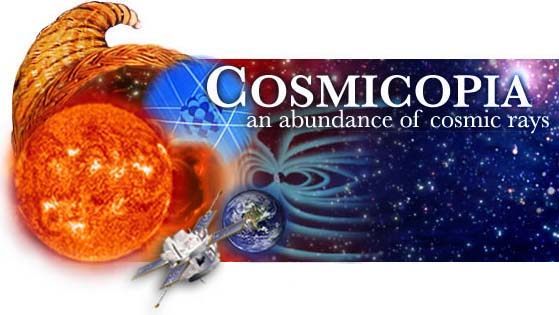
Ask Us
General Physics:
Gravity
Gravity - Definition of a "G"
What is the definition of a "G", that is the unit of acceleration? And, if it exists, I need a global equation for calculating acceleration in units of Gs. I have met with material saying that it is dependent on whether you are "standing up" or "upside down"? That it is dependent on physiological effects (red out vs. blackout)? And what about in space where direction is irrelevent (but to some, it is relevant to the calculation)? And is there a sign convention?I think that if you assume that one "G" is the average acceleration of gravity at the surface of the Earth, you'll be fine. The actual value varies slightly from the poles to the equator, and doesn't necessarily point at the center of the Earth. But the canonical numbers are 9.8 meters / sec2 or 32 feet / sec2 (which are already different by about 0.5 %).
Dr. Eric Christian
Speed of Gravity
What is the speed of gravity?Gravity travels at the speed of light.
Dr. Eric Christian
(October 2001)The Cause of Gravity
My friend thinks gravity is caused by the Earth spinning, and I think it is caused by the Earth weighing so much we stick to it. Who is right?You are correct. Gravity is caused by the mass of the Earth and has nothing to do with it's spinning. The spinning of the Earth actually reduces the "gravity" felt by someone at the equator as compared to someone at one of the poles. It is just one of the facts of the Universe that everything that weighs anything, pulls other matter towards it, and the more it weighs, the bigger the pull.
Dr. Eric Christian
(November 2000)Why Does the Universe Have Gravity?
Why does the Universe have gravity? If everything in the Universe was condensed into a singularity before the Big Bang, then gravity must have come from the Big Bang, or gravity predated the Big Bang.According to Einstein's Theory of General Relativity, gravity is the curvature of space that results from a massive object. Think of a sheet of rubber with heavy marbles placed on it. The rubber around the marbles will be curved and smaller marbles placed nearby will roll toward the heavier ones. This is analogous to the way massive objects warp space. This warping is called gravity.
Dr. Louis Barbier
Does Gravity Increase as Mass Increases?
Does a particle's relativistic mass increase result in a corresponding increase in the gravity field generated by the particle?Yes, the particle has an increase in energy (kinetic and mass increase) and under general relativity, it is energy that generates a gravity field, not just rest mass.
Dr. Eric Christian
Does Gravity Affect Height?
Does gravity affect how tall you are during the course of a day?No, the Earth's gravity doesn't change over the day, and the effect of the Moon is small unless you are the size of an ocean. And even zero gravity (what the astronauts feel) doesn't change your height in the short term.
Dr. Eric Christian
Where is Zero G?
Exactly where does zero gravity start, and can a jet or prop/plane reach zero gravity? At what altitude does oxygen cease to exist?Zero gravity is a bit of a misnomer. It is used to describe the condition when an object is freely falling with no resistance. You can feel zero G in a plane, roller coaster, or elevator. Gravity is still present, however. Something in orbit is essentially freely falling around the Earth.
But oxygen and the rest of the atmosphere (mostly nitrogen) just gradually fade out and extend hundreds of miles over the surface of the Earth. Even where the shuttle and space station are (greater than 400 miles up), there is enough air resistance that there is apparent acceleration of about a millionth of that on the Earth's surface. This is why experiments there are called "microgravity" experiments, not zero G experiments.
Dr. Eric Christian
Build a Chamber with Zero G?
I would like to build a chamber with zero gravity. If I build an air tight chamber or room, and then pump the air out of the room, will that make the room have zero gravity?Sorry, but your idea is not correct. Gravity is not caused by or transmitted by the atmosphere (air). The only way to experience zero gravity is to get far away from any massive body, such as a planet (including the Earth) or moon.
Dr. Louis Barbier and Beth Barbier
Escape Velocity
How do you compute the escape velocity of a particle leaving Earth's gravitational field?If you do the math right, this should work out:
escape velocity = square_root (2 * G * mass of Earth / radius of Earth)
G = 6.67 x 10-11
mass of Earth = 6 x 1024 kg
radius of Earth = 6.4 x 106 mDr. Louis Barbier
(November 2001)Propagation of Gravitational and Electromagnetic Fields
What is the classical perception of "how fast" an electric field, which extends to all points in space around a charge, actually reaches to all points in the universe?Changes in gravity and electromagnetic fields propagate at the speed of light. Despite thought experiments to the contrary, you can't instantaneously change either. Everything, matter/energy and electric charges, moves at the speed of light (energy only) or less and the subsequent changes move out at the speed of light. The field lines are already there.
Dr. Eric Christian
(May 2002)Does Charge Affect Gravity?
A few years ago, I heard the president of a company (I think it was Boeing) say that if you drop two objects off a building, they fall at the same rate... except if you charge one. He said there would be more information coming, but I never heard about it again. Is this true?We could not find any quotes from Boeing personnel similar to the one you describe, but the force of gravity does not depend on an object's electrostatic charge. If two objects, one charged and one not, are dropped off a building, then they will fall at the same rate. The only way that the two objects would fall at different rates is if there is another charged object on the ground, which would affect the charged falling object but not the uncharged one.
Dr. Nick Sterling
(February 2007)Electromagnetism and Gravity
Is it possible that the force we call gravity is actually a magnetic field? Could high energy plasma rotating on an axis explain this? Could this explain the behavior of the surface of the Sun, such as solar flares and sunspots?Gravity and electric/magnetic forces are quite distinct in physics, and are not generally thought of as closely related.
Gravity is related only to mass and not to electrical charge. The gravitational force between two static point masses is proportional to the product of the masses and inversely proportional to the square of the distance between them. This leads to the concept of a gravitational field. The gravitational force is not directly related to the electric or magnetic forces.
The electrical force between two static charges is proportional to the product of their electrical charges and also is also inversely proportional to the square of the distance between them. This leads to the concept of an electric field.
The magnetic force is very closely related to the electric force, but no magnetic charges (magnetic monopoles) or monopolar magnetic fields have been observed, in spite of many careful searches. There are currently only (very, very small) upper limits on their abundances. There is no accepted proof that magnetic monopoles cannot exist, so magnetic monopoles may be found some day. The sources of magnetic fields are electrical currents, caused by moving electric charges or small dipoles associated with molecular and atomic structure.
The relationship between electricity and magnetism was written down in the 19th century by Maxwell, and his equations show elegantly the intimate relationship between electricity and magnetism.
To go back to your question: all magnetic forces on matter are also proportional to the electric charge on that matter, but also depend on the velocity of the matter. Hence, like electric forces, they are not proportional to the mass. Hence, any attribution of gravitation to electromagnetism is not possible in the current paradigms of physics.
Dr. Randy Jokipii
(February 2005)Anti-Gravity
Has anyone ever created an anti-gravity device?A few years ago, Russian physicist Yevgeny Podkletnov published results claiming he had built a device consisting of a superconducting disc and electromagnets, which reduces the force of gravity on an object by about 2%. However, despite the fact that this research was published in 1992, no other scientists have been able to replicate Dr. Podkletnov's claimed result. Because of this, most scientists in the field of gravitational research consider Dr. Podkletnov's result to be highly suspect.
I also looked at material on the Barbury Gravity Shielding tests and found the claims/results they present difficult to believe. I could find no report of their experimental result in a peer-reviewed scientific journal, and by their webpage's own admission the effect they claim has not been duplicated by any other group. I am not convinced there is any validity to these tests and emphasize that anyone can make claims and publish web pages. But without vetting work through peer scientific review and having other scientists perform confirming experiments, their scientific validity is in serious doubt.
At this point in time, it is fair to say that "anti-gravity" devices such as this are purely science fiction.
Dr. Nick Sterling
(February 2007)
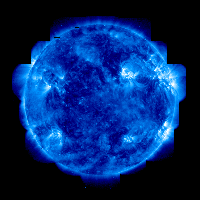
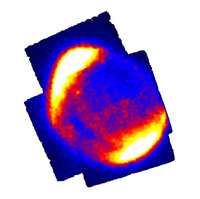
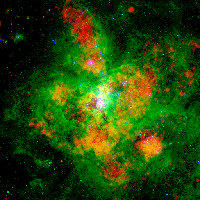
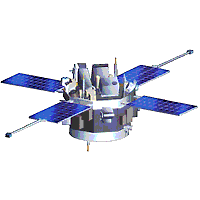
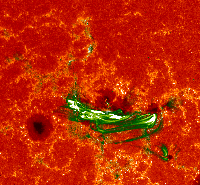
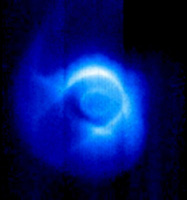
Questions and comments to: cosmicopia@cosmicra.gsfc.nasa.gov
Curator: Dr Eric R. Christian, NASA
Responsible NASA Official: Dr Eric R. Christian
Privacy Policy and Important Notices

HOME
In the News
History
Ask Us
Great Links
Glossary
Site Map
Search NASA